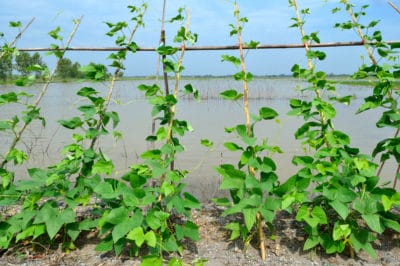Support System Basics
No matter what kind of support you choose, it must be sturdy enough to bear the weight of the bean plants even when they are wet and loaded with beans. In many cases, this means sinking posts about two or three feet deep at either end of the trellis. Many beans can climb 10 feet or more, so eight feet is a good minimum height.
Pole Beans and Half Runners
Bush beans, as the name implies, are short and bushy. Pole beans are long vines. Half runners are somewhere in between, but most gardeners treat them like pole beans because they do better with some support. Pole beans actually twine up their supports, but half runners need to be tied, as their stems are more like those of bush beans – just longer.
What Kinds of Pole Beans are There?
Pole beans are classed as ornamental, edible or a combination. Varieties you can find easily include:
- Blue Lake – a green or snap bean noted for flavor.
- Kentucky Wonder – another old-time favorite green bean.
- Romano – a flat Italian bean.
- Runner bean – very ornamental as well as edible; attracts hummingbirds
- Hyacinth bean – used as an ornamental for its showy flowers.
Trellises for Pole Beans
Whether made of wood or another material, a trellis usually offers excellent support for pole beans. Some gardeners use fixed trellises and rotate plantings of beans, cucumbers and tomatoes through the planting area. Others set up a new trellis each year. The trellis may be vertical only, shaped like an arch or two uprights with a section across the top.
Fences for Pole Beans
Many fences make excellent bean supports. Chain link in particular is a good choice, although woven wire will also work well. One disadvantage of a fence is that you must rotate your beans every year to avoid soil-borne diseases. However, you might plant flowering vines such as morning glories against the fence in “off” years to provide a good rotation system.
Other Choices
The classic choice for support is the pole. Sink it deep in the soil and plant beans around it or use several poles teepee fashion. Rough or textured poles give the bean a better climbing surface. Commercial bean towers also work well and can be used for years. Tomato cages are good for half runner beans, since they are not as tall.
